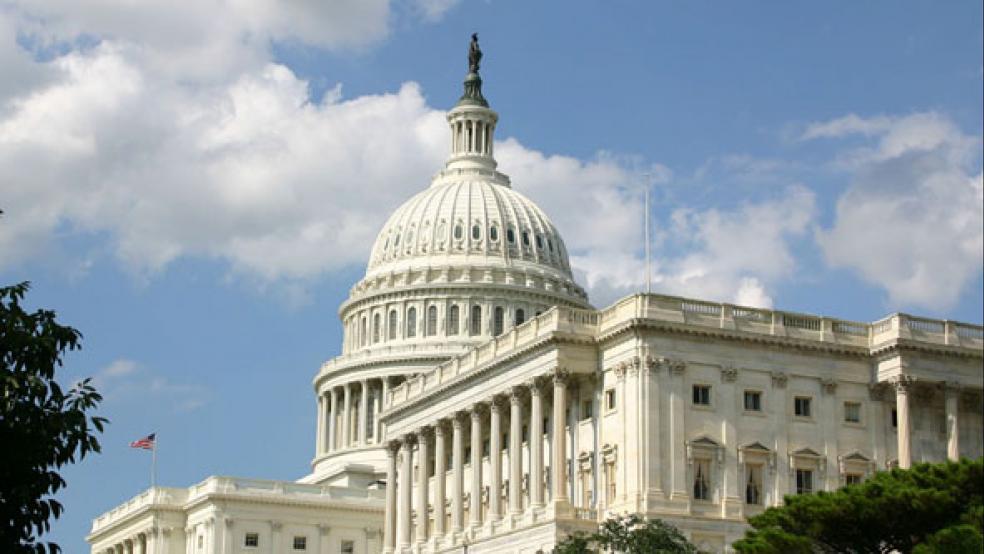Asked during his Monday press conference why 69% of Americans in a recent poll indicated they did not want the debt ceiling lifted, President Obama suggested that most people were not really paying attention to the down-to-the wire negotiations. He’s wrong. The entire globe is focused on how the world’s largest economy is going to right itself; so far, the process has been anything but impressive.
President Obama has run into a brick wall. It’s called the will of the people. The reason he can’t force Republicans to raise the debt ceiling is that he will not countenance a deal that cuts spending but doesn’t raise taxes. He seems unable to grasp that 236 Republicans in the House of Representatives and 41 Senators have signed the Taxpayer Protection Pledge, promising that they will “oppose any and all efforts to increase the marginal income tax rates for individuals and /or businesses…and oppose any net reduction or elimination of deductions and credits, unless matched dollar for dollar by further reducing tax rates.”
The newly elected Republicans in the House believe they were sent to Congress to harness runaway government by reducing spending. They are, shockingly, committed to the principles on which they campaigned. This is such a foreign concept in Washington that it seems President Obama can’t wrap his mind around it.
Freshman Representative Nan Hayworth (R-N.Y.) has signed the pledge, which she says “represents principles I believe in.” She explains that increasing taxes on higher-income earners “would not be beneficial…a lot of that income finds its way into venture capital funds and other investment vehicles that can lead to job growth.” She says, “There is no historical evidence we would be doing the right thing” in raising taxes, and allows that increasing revenues should follow (and not precede) an expansion of the workforce.
“Increasing taxes on job creators is the last thing we should do,” says Hayworth. “We need to be activating and rewarding job creators, and assuring them the government will act responsibly.”
Dr. Hayworth (she is an ophthalmologist) is not a member of the Tea Party Caucus; she is not a nut. She knows that we have raised our debt ceiling 74 times since 1962, that spending is the highest it has ever been relative to GDP (except during World War II), and that it must come down. She objects to tax increases but would support reform that ushers in a flatter, fairer tax code.
Tax reform, of course, was the place where the President and Congress hoped to find common ground. Everyone is in favor of tax reform, as long as someone else feels the impact of deductions that fall by the wayside. The tax code is a monumentally obese and convoluted monster that certainly needs overhaul. But -- call me crazy--I’m not sure that overhauling our tax code and revising our entitlements programs should be the handiwork of a weekend.
That President Obama and Speaker John Boehner have failed to reach an agreement on a “big” deal to slice future budget deficits is perhaps lamentable, but that these enormous topics are being hashed out in emergency sessions is absurd. Congress and the White House have known for months that the debt ceiling would be breached mid-year. We have long recognized that our debt was approaching critical and suffocating levels. Why this 11th-hour skirmish?
More to the point, whatever happened to the Deficit Commission? That bipartisan group was convened to study our financial future and present thoughtful ideas on long-term solutions to the mess we are in. President Obama set up the commission in such a way as to minimize the impact of its recommendations on the November elections – a political calculation that proved worthless. But even though the commission was asked to report back in December, long after the electoral horse had left the barn, angry voters didn’t wait for its conclusions: They passed their own deficit-reduction plan by electing 87 new Republicans to the House, giving the GOP a 242-193 majority in that chamber.
President Obama must be kicking himself for not having gone to bat for his commission’s program. Commission co-heads Alan Simpson and Erskine Bowles did their job admirably. They did indeed report back in December, which just goes to show that some government work can proceed on schedule, but they reported back to an empty room. The President, astonishingly, did not attend the press conference on Dec. 1; he had a very important meeting with then Press Secretary Robert Gibbs that afternoon.
That was a mistake. Much of the nation liked the commission’s report, which outlined a plan to reduce the deficit by $4 trillion dollars by 2020; they saw a sensible balance. Government spending had to come down, and revenues had to go up. The ratio struck was two dollars of cuts for every dollar of tax hikes. That’s a far better approach from the point of view of Democrats than the recent near-deal, where the ratio of spending cuts to tax hikes was four-to-one.
Dr. Hayworth endorses the idea of a smaller debt-ceiling deal right now. She may be right. A smaller deal would be more transparent and likely contain fewer booby traps of the sort hidden in grandiose schemes like Obamacare. There was talk that the proposed spending cuts would occur in the “out” years, while tax hikes pushed by the president would begin in 2013 (after the election, of course). This won’t do. Americans are paying attention, Mr. President, and they want change—change they can really believe in.
More debt-ceiling coverage from The Fiscal Times:
McConnell Turns Debt Ceiling into a Political Football
5 Ways Obama Can Break the Debt Ceiling Impasse
Debt Talks Unintended Consequences: Job Losses






